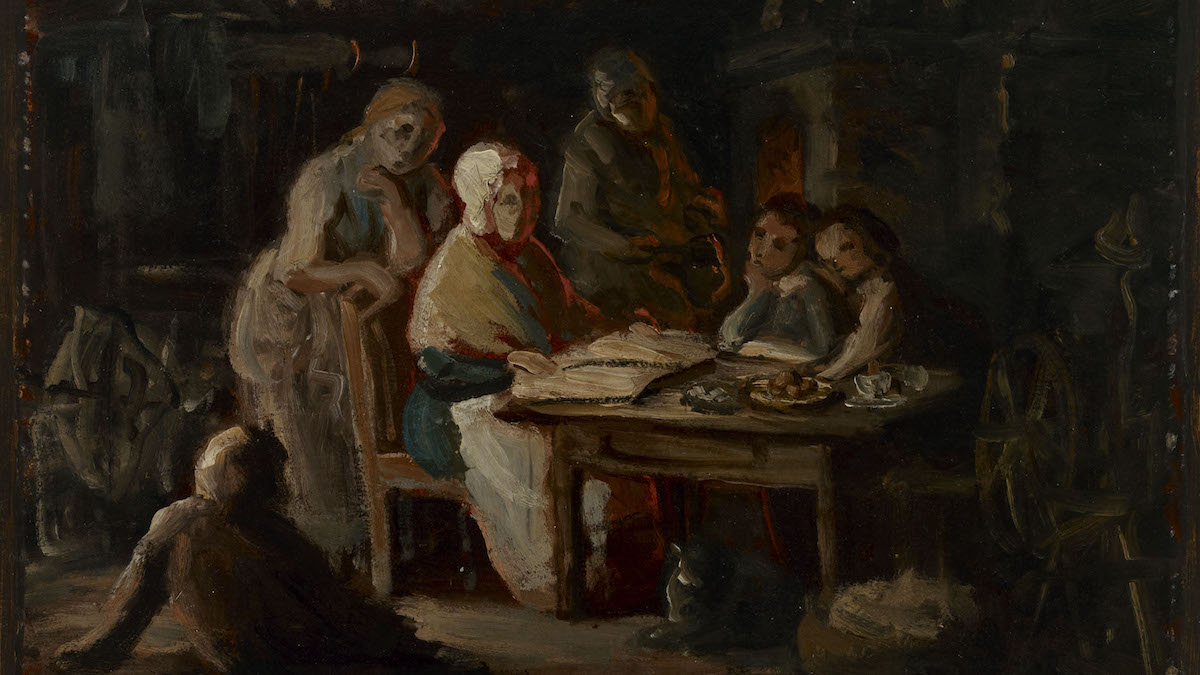When you imagine yourself in your old age, what do you want to be called? How do you want to be seen?
There are some names that may be assigned to you involuntarily: Spinster, Hag, Gossip, Scold. But there’s another title that’s worth making a conscious effort to earn: Matriarch.
Oxford Languages defines the word as “a mother or woman who heads a family or tribe,” and traces its origins to the early seventeenth century. Some sex-realist or reactionary feminists, such as Louise Perry, have begun to embrace the title as aspirational, reclaiming it from anti-matriarchal figures on both right and left.
Negative connotations with “matriarchy” stem most prominently from far-right accusations of the “Longhouse” pervading our institutions. In internet speak, the term “Longhouse” is shorthand for the claim that, in recent decades, social norms have been reformulated to prioritize feminine needs and methods for controlling people’s behaviours. Proponents of the “Longhouse” theory argue that a kind of matriarchy has come to exist, much to the detriment of our society.
In a more subtle way, the denunciation of matriarchy is also visible on the progressive left. It primarily makes itself known through the increasing apprehension (and even scare tactics) surrounding pregnancy and motherhood in progressive media. Promotion of motherhood as a positive and even normative choice for women goes against their creed of reproductive freedom for all and the amplification of non-traditional family models. The pursuit of self-actualisation is so central to the liberal model of happiness that the prospect of any kind of enduring “non-fluid” commitment seems frightening and restrictive.
What unites left and far right is the idea that “matriarchy” poses a societal problem. Both fail to see the advantages of a genuine matriarchy, one that would give purpose to women and foster societal cohesion. Becoming a matriarch should be a significant life goal for all women, whether they are biological mothers or not. Embracing a fresh view of matriarchy holds the potential for profound benefits—and happiness—across generations.
The Inevitability of Aging
There is a physical path of development that the female body naturally follows: the occurrence of menarche demarcates the physical transition from girl to womanhood, accompanied by a change in hormone levels that realigns our interests in childish things to those of a more mature nature. As it develops, the female body becomes attractive to the opposite sex, and the woman herself begins to experience sexual attraction toward men. If all goes well, she can now bear and birth children. Assuming there are no biological impediments, females are ushered from these youthful stages effortlessly by their bodies, and in doing so they signal their success and status as a healthy woman.
However, as women age, this path of development can become increasingly difficult to embrace. The next steps are still guaranteed (menopause, greying hair, wrinkles), but the loss of physical attractiveness and markers of fertility often leads to a loss in social status, as older females are no longer able to as successfully compete with younger females for access to high-status males. Whereas an increase in wealth and status can compensate for an aging body in males, women are penalised more harshly by society for their decreasing sex appeal; in the transhumanist western world, there is increasing pressure for women to resist nature taking its course, and scrutiny and disparagement await those who go too far or not convincingly enough. The widespread acceptance of no-fault divorce makes even married women feel less secure. The gradual demise of something that was once granted without thinking or asking—their sexual attractiveness—can be very hard for aging women to accept and endure.
The female transition from young-age to middle-age to old-age is natural and inevitable. But becoming a mother—and later, a matriarch—is, now more than ever, a choice. This problematizes the identity of women beyond maidenhood in a way that simply wasn’t common before the advent of mass-marketed contraception and no-fault divorce. Our choices in youth have a very real impact on our role—and in many cases, our satisfaction—later in life.
Regardless of whether we were full-time homemakers, worked part-time, continued to pursue a full-time career along with children, or never had children, what should successful womanhood look like as we exit our fertile years? Some encourage older, post-menopausal women to be independent and free to engage in all the enjoyable pursuits they missed out on as young mothers, such as around-the-world cruises and becoming Ladies Golf Captain. I do not doubt that some of these activities do offer pleasure and satisfaction to older women. But generally, this promotion of individualism above caring for family and a community is deleterious, both to women themselves and to greater society.
Enter the matriarch.
The Matriarch as Aspirational Figure
Any woman, upon aging out of their fertile phase, is eligible for the role of “matriarch.” To accept this mantle is to act as a keystone for one or multiple communities, such as family, friends, colleagues, or neighbours. An icon of the post-fertile female, the matriarch is an advocate for the female embodied experience in all of its continuity. Her duties include imparting wisdom, coordinating intergenerational narratives, and influencing female destinies.
Children are not a prerequisite for entry into the matriarchal, “venerated older woman” role. Instead of kin, you can have your clan. By being visible and active in your community, you are in a position to listen to those around you, provide support, and earn influence. You can become a virtuous model for others to look up to.
Today, when social media seeks to convince young women to cling to their youth at any cost, providing examples of older women respected by and essential to their larger communities is especially important. The matriarch is one who sustains connections. This can be in small acts, such as welcoming new residents and sending Christmas cards, or large ones, such as planning trips, hosting events, providing counsel, and maintaining familial relationships that threaten to become strained after divorce or death. Perhaps most significantly, matriarchs are gatekeepers: they wield unparalleled influence as they skilfully navigate the intricate web of interpersonal dynamics within a family or community, arbitrating between members and exercising an unwavering commitment to the prosperity and well-being of their closest kin.
For those older women with grown up daughters (or daughters-in-law) of their own, there is an abundance of opportunities to apply your maternal wisdom. You can look after these younger women during their pregnancies and childbirths; you can support postpartum mothers (as women have done for centuries in the form of “lying in”); you can aid with childcare. Your own experiences are your legacy: visceral and enduring. Interestingly, grandparents have a tendency to feel closer to the offspring of their daughter(s) over those of their son(s); studies have shown that people favour their relationships with their mother’s side of the family, in a phenomenon known as the “matrilineal advantage.” It would appear that women both young and old are more likely to put the work into sustaining relational bonds.
Although there are difficult familial situations and exceptions where people are compelled to outsource their caregiving needs to the state or to private companies, those who are able to maintain familial bonds should aspire to make this the norm. It’s not just more economical or more innately desirable; it’s also demonstrably healthier for children, mothers, and grandmothers alike.
Those women who have put off childbearing until late in life may find themselves suffering from the “grandparent deficit” : the negative impact of absent grandparents in their children’s lives—or, similarly gloomily, the impact of grandparents primarily being people who require care as opposed to being caregivers themselves.
Individualism Isn’t Liberating
I am not proposing anything new here. The institution of the Wise Woman is one that has been honed and tested by time. She is still with us today: only modern westerners are seeking answers from Google instead of grandmothers. Is this truly preferable? Or indeed, liberating?
The modern loss of the matriarch in Western societies stems, at least in part, from what Joseph Heinrich calls “WEIRD Psychology”: the individualistic world-view resulting from the dismantling of traditional tribal family structures, with individual asset ownership superseding communal-family ownership. In the twenty-first century, the indicator of a “successful” familial relationship is when a child moves out from their childhood home, usually a non-negligible distance away, and demonstrates their ability to live a life completely independent of their parents. Yet surging rates of loneliness and depression belie the notion that atomised adulthood equals progress.
Jim Dalrymple has called for the revival of kin-keeping: “a kind of invisible infrastructure that holds a family together even, or especially, when there’s pressure that might push it apart.” Although I believe the concept of a matriarch is more helpful for both women and society at large, Dalrymple is correct in asserting that the work of the matriarch goes largely unseen: the initiation and maintenance of connections, the coordination of get-togethers and celebrations, the promotion of collective well-being and intervention if this is threatened.
Given the current media focus on high-flying careerist women, it is little wonder that many are unavailable or willing to take on the role of matriarch. Most women are not among this vaunted elite class of professionals—they have jobs, not careers—but they too suffer from the effects of luxury beliefs that have eroded social networks, leaving them struggling to support and care for their nuclear families. Solipsistic “self-actualisation”—the antithesis of the matriarchal ideal—is annoyingly in vogue. Self-help books encourage readers to break the bonds imposed upon them by society, so that they may discover their “true selves,” and the ”strong female character” trope is ubiquitous in modern cinema.
Given this emphasis on the self and the decline of cohesive social institutions, is it any wonder that more than one in ten women suffer from post-natal depression, or that women are being forced out of the workplace due to childcare costs, when we have abandoned customs that worked directly to counteract such problems? Older cultural practices surrounding women and child-raising arose from a collective experience of what contributed positively to a community’s wellbeing and cohesion. The roles established by our female ancestors were passed down through the generations for a reason. It would be folly to forget them, for, as Louise Perry observes, “Traditions are experiments that worked.”
We should not seek to trap our youthful selves in amber, or pretend that atomisation is optimal for the elderly. Bonds with our kin and clan are essential, and—contrary to the tenets of modern progressivism—they are both healthy and liberating.
It may sound morbid, but it’s worth asking yourself: how would you like to die? I don’t mean physically, but rather, in what role do you see yourself when your time inevitably comes? Do you want to be someone who is remembered for having been the life of the party in their twenties? For earning that career award in their thirties? For being a sweetheart in the care home, but with no visitors, disconnected from the life she once lived?
I want to die as a matriarch: surrounded by children and grandchildren, who are grateful for the role I played in their lives and who see and value the purpose I had there. I want to be remembered fondly by the community I chose to serve. I want to leave the world, not with a bang, nor with a whimper, but as part of an ever-increasing chain.



